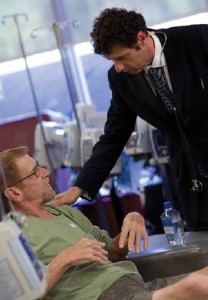Research Means Hope For Cancer Patients In Southwest Florida
 As the largest independent oncology/hematology practice in the United States, Florida Cancer Specialists & Research Institute (FCS) has always had a forward-thinking attitude towards clinical trial research. “Clinical trials are vital to our practice,” says FCS oncologist Dr. Rebecca Kosloff. “The reason cancer survival rates have dramatically increased over the past two decades can be traced directly to clinical trials. Florida Cancer Specialists’ association with multiple research organizations such as the Sarah Cannon Research Institute, one of the nation’s largest clinical research programs, gives our patients access to national and international clinical trials, which means we are able to offer patients more options.”
As the largest independent oncology/hematology practice in the United States, Florida Cancer Specialists & Research Institute (FCS) has always had a forward-thinking attitude towards clinical trial research. “Clinical trials are vital to our practice,” says FCS oncologist Dr. Rebecca Kosloff. “The reason cancer survival rates have dramatically increased over the past two decades can be traced directly to clinical trials. Florida Cancer Specialists’ association with multiple research organizations such as the Sarah Cannon Research Institute, one of the nation’s largest clinical research programs, gives our patients access to national and international clinical trials, which means we are able to offer patients more options.”
What is a clinical trial?
Clinical trials are research studies in which patients help doctors find ways to improve cancer care and assess new therapies and treatments for the disease. Each study tries to answer scientific questions and to find better ways to prevent, diagnose, or treat cancer.
The cures for various types of cancer will all come from clinical research, yet many adult cancer patients don’t participate in clinical trials. Why? Many times it is because clinical trials are misunderstood and patients fear being “a guinea pig” or they are concerned they might be given a placebo or a drug that will prove to be ineffective. In clinical trials for a life-threatening disease like cancer, no one who participates in a clinical trial is ever treated like a guinea pig, and in clinical trials for cancer, a patient is never given anything less than the current best standard of treatment.
prove to be ineffective. In clinical trials for a life-threatening disease like cancer, no one who participates in a clinical trial is ever treated like a guinea pig, and in clinical trials for cancer, a patient is never given anything less than the current best standard of treatment.
FCS oncologist Dr. Joel Grossman has seen many patients achieve positive results because they qualified for a clinical trial. “Obviously, it’s nice when someone does well, but it’s especially gratifying to see how beneficial it is for patients to enroll in clinical trials so that our treatments can improve over time. At Florida Cancer Specialists, we have an extensive clinical trial network, so new drugs and new combinations can be discovered that provide better outcomes and, hopefully, easier treatments for patients.”
Who can participate in a clinical trial?
All clinical trials have rules and guidelines about who can or cannot participate. These guidelines are necessary to ensure that researchers obtain the most scientifically accurate results and outcomes. If you are considering participating in a clinical trial, your doctor can provide substantial information about the trial and help determine whether or not you will qualify. It’s your personal choice if you want to participate in a clinical trial for cancer. If you are unsure, you can talk to your doctor, family, and friends. Knowing as much as you can about the trial will help make your decision easier. “We are the first community-based practice ever to guide the development of a new drug from start to finish,” says Dr. Mark Rubin, one of the leading researchers at FCS.
“We designed an innovative clinical trial that was used nationally for the development of Erbitux and ultimately led to its approval. As a practice, we are not leaving research up to academic medical centers. We now have two drug development units that are aggressively pursuing new therapies and new ways of fighting cancer.”
 “The types of doctors who work in this practice,” Rubin continues, “are able to fulfill their patients’ dreams because they are really focused on the individual patients, not just on their diseases. We never forget that the patients who sit across from us are no different from our own family members, so we have to figure out the best drugs that can be used in each individual case. Our practice is devoted to doing what is morally and ethically right… to find new ways of treating cancer in the future and not just settle for what has not worked all that well in the past.”
“The types of doctors who work in this practice,” Rubin continues, “are able to fulfill their patients’ dreams because they are really focused on the individual patients, not just on their diseases. We never forget that the patients who sit across from us are no different from our own family members, so we have to figure out the best drugs that can be used in each individual case. Our practice is devoted to doing what is morally and ethically right… to find new ways of treating cancer in the future and not just settle for what has not worked all that well in the past.”
An integral part of the FCS continuum of care is the Florida Cancer Specialists Foundation. The nonprofit organization provides non-medical living expenses (rent, mortgage, utilities, car payments, etc.) to qualified cancer patients by offering short-term, one-time financial support to individuals undergoing cancer treatment in the state of Florida.

Leave a Reply
Want to join the discussion?Feel free to contribute!